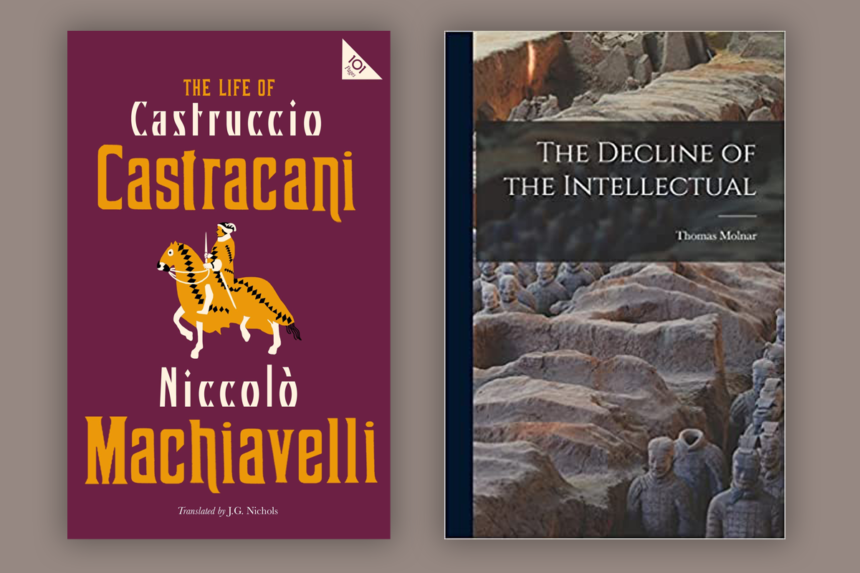What makes a prince? Machiavelli had some ideas. “Above all he should do as some excellent man has done in the past who found someone to imitate who had been praised and glorified before him,” he wrote. “[One] whose exploits and actions he always kept beside himself, as they say Alexander the Great imitated Achilles; Caesar, Alexander; Scipio, Cyrus.”
Many readers of political issues are familiar with The Prince, Machiavelli’s most infamous work about the world of political power. It is a manuscript for direct action, a stiletto for those willing to bloody their hands and to break oaths to advance their ends. Indeed, in The Life of Castruccio Castracani, Machiavelli’s eponymous hero shows little remorse at breaking his word. If he does not, others will, and render him an honest dead man.
Like much of Machiavelli’s work, this book is not for everyone. However, for those interested in knowing the father of political science better, it provides insight into key themes that recur in his more well-known books: The Prince, the Discourses on Livy, and The Art of War.
Machiavelli’s Castruccio is part historical figure, part literary creation. There was a duke of Lucca by that name who served as an Italian mercenary captain. However, the German-American political philosopher Leo Strauss found that some of the things Machiavelli attributed to Castracani originated in classical Roman and Greek sources. Castruccio is depicted as a founder of sorts, standing in Machiavelli’s pantheon alongside Moses, Cyrus, Romulus, and Theseus. In Machiavelli’s telling, he was discovered as a baby in a vineyard.
Castruccio strides across the pages as a nearly-perfect prince of humble origins—someone who, by his own virtue rather than birth, attains the flash of greatness. Indeed, central to this work, as with Machiavelli’s others, is the contest between virtue and fortune. Fortune is a woman a prince must overcome or turn to his advantage; elsewhere Machiavelli describes it as a powerful river to be contained with “dikes and dams”—calculated acts of caution, courage, craft, and stupendous violence. Castruccio comes close to mastering fortune, but even he is not clever enough to understand all her designs.
Though Castruccio Castracani is a lesser-known work, it is essential reading for those who want to understand Machiavelli’s moral principles and political philosophy. Careful reading is rewarded with insights into political power.
—Pedro Gonzalez

Bashing intellectuals is a well-established tradition on the right and a darned fun parlor game. Books by conservative pundits deriding eggheads generally sell well. One sits atop The New York Times’ best seller list as I write. But if we want conservative criticism of the intellectual class grounded in thorough social historical understanding, we would do well to pass beyond the best-selling pundits and to seek more profound sources.
Thomas Molnar’s The Decline of the Intellectual should be on a short list for anyone seeking to understand the role played by intellectuals in the political, economic, and cultural revolution of modernity. The key involves the relationship of the intellectuals to the new social class that emerged as dominant throughout the West in the wake of the democratic revolutions. This was the bourgeoisie, made up of the commercial classes who came to wealth, status, and power because of the perfect fit of their materialistic worldview with the Industrial Revolution. As the bourgeoisie became the social and cultural force driving Western societies, the intellectuals, who formerly relied on the patronage of aristocratic elites, hitched their wagon to this new ruling class group. The radicalism of the intellectual class was thereby assured.
For the bourgeois, material accumulation is the purpose of life and the evidence of a life well-lived. The intellectuals provided them the new doctrines and technologies to solidify their rule based on that ethos. Humans had always sought peace, unity, and prosperity, but the bourgeoisie’s triumph meant that what had been a largely unattainable ideal, whose incompleteness was explained and assuaged spiritually, was now presented as an eminently realizable end—if only the drags on human accomplishment could be removed.
What drags? Cumbersome things like religious faith, traditional hierarchical structures, and authority with the pedigree of centuries. Also needed is an understanding of man rooted in awareness of his severe limitations. The intellectuals wielded two new religions to replace the old faith: Science and Democracy. But polytheisms have a way of evolving into monotheisms, and in the time since Molnar’s writing, the second of these gods, in a transformed incarnation of Social Justice, has emerged as the one true deity. One that calls Science itself to heel if it poses any obstacles to the perfectly uniform utopia of Equity.
To fully understand just how corrosive to the traditional cultural order our contemporary intellectual class is, one must read Molnar.
—Alexander Riley

Leave a Reply